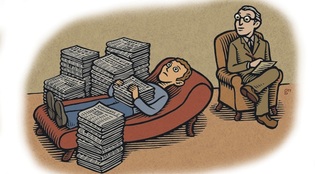 loading
loading
FindingsSave this articleHelp for hoarders.  Gregory NemecView full imageEveryone has some degree of clutter on their desks and, yes, in their closets, attics, garages, and basements. "That's perfectly normal," says David F. Tolin, associate professor (adjunct) of psychiatry. "I'm rather messy myself." But some of Tolin's patients have taken accumulation to pathological extremes. They live in houses choked with material most rational observers would term junk. Psychiatrists term this condition compulsive hoarding (CH). Tolin, who runs the Anxiety Disorders Center at the Institute of Living in Hartford, Connecticut, estimates that the number of sufferers could run "in the millions. It's not a rare condition." People with CH can't stop accumulating things, and they can't part with their things. In a recent Internet survey, Tolin and his colleagues measured the dismal effect of CH on 665 family members and friends of hoarders. Children who grew up in such overly cluttered circumstances "rated their childhoods as less happy, reported more difficulty making friends, [and] had people over less often," the researchers report in the January 3 online issue of Behaviour Research and Therapy. The survey also revealed that hoarding often led to rejection. "People who hoard tend to live pretty unhappy, socially isolated lives," says Tolin. Because CH was thought to be an obsessive-compulsive disorder, antidepressants were the treatment of choice. But the drugs often didn't work. And studies at other institutions have shown significant differences between the brains of hoarders and OCD sufferers. "We're now leaning towards seeing these as different conditions," says Tolin. In an as-yet unpublished study using functional magnetic resonance imaging, Tolin's team found that when hoarders looked at one of their possessions, the "thinking parts of the brain -- the orbital frontal cortex -- and memory centers in the hippocampus went on overdrive." This suggested that treatments aimed at cognition might work. Tolin and his colleagues showed that an extended course of cognitive behavioral therapy -- 24 weekly sessions -- aimed at managing the condition helped. "A majority of patients showed clear improvement," Tolin reported in Behaviour Research and Therapy in December. "They're not cured, but they're better able to deal with their hoarding problems."
The comment period has expired.
|
|